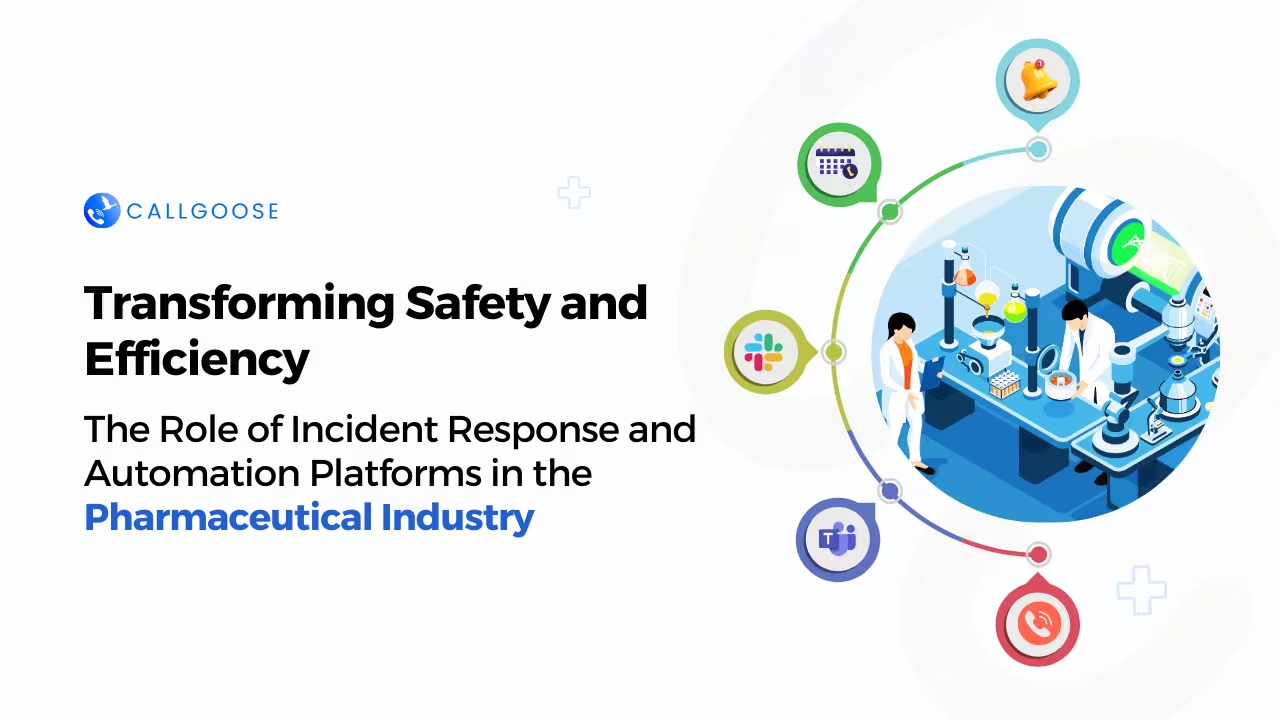
CALLGOOSE

CALLGOOSE
BLOG
04 July 2024 | Amelia Gaby
8 Minute Read
The logistics and transportation industry is the backbone of global commerce, ensuring goods reach their destinations efficiently and timely. However, with the increasing complexity and scale of operations, incidents are inevitable. Whether it's a vehicle breakdown, traffic congestion, or supply chain disruption, every incident can impact operations and profitability. In this digital age, traditional incident response methods fall short of addressing these challenges. Enter modern incident response and automation platforms, revolutionizing how the logistics and transportation sector manages incidents. Let's delve into the benefits, challenges, and the urgent need to embrace this transformative technology.
The Evolution of Incident Response in Logistics:
The logistics industry has evolved significantly over the years, with advancements in technology driving operational efficiency and streamlining processes. However, incident response has often lagged, relying on manual, reactive approaches that are ill-equipped to handle today's complex challenges. Modern incident response platforms represent a paradigm shift, leveraging automation, AI, and real-time data analytic to transform how logistics companies manage incidents.
Benefits of Using Modern Incident Response and Automation Platforms in Logistics and Transportation Industry:
The logistics and transportation industry keeps the world moving. It's an intricate web of interconnected processes, from managing shipments across continents to ensuring on-time deliveries within cities. However, this very complexity creates vulnerabilities. Security breaches, cargo theft, and transportation disruptions can cause significant financial losses and reputational damage. Modern incident response and automation platforms emerge as powerful allies in fortifying the resilience of logistics and transportation companies.

Let's explore how these platforms can significantly benefit the industry:
1. Bolstering Security Against Cyberattacks:
The logistics industry heavily relies on digital infrastructure, making it a prime target for cybercriminals.
Automation platforms can significantly enhance cybersecurity by:
Swift Threat Detection and Response: They continuously monitor systems for suspicious activity, employing machine learning to identify malware, phishing attempts, and unauthorized access attempts. This allows for swift isolation and mitigation of threats before they disrupt operations.
2. Strengthening Supply Chain Visibility and Security:
Logistics networks sprawl across vast geographical distances, making complete visibility a challenge. Automation platforms can address this by:
Real-Time Shipment Tracking: By integrating with GPS and sensor data, the platform can provide real-time location updates for shipments. This allows for pinpointing potential delays or disruptions and taking corrective measures promptly.
3. Ensuring Swift Response to Transportation Disruptions:
The transportation industry is susceptible to various unforeseen disruptions, such as extreme weather events or traffic accidents.Automation platforms can aid in:
Automated Incident Alerts: The platform can monitor traffic data, weather forecasts, and social media for reports of disruptions. Real-time alerts allow companies to reroute shipments, inform clients of potential delays, and take necessary actions to minimize the impact.
4. Streamlining Regulatory Compliance:
The logistics and transportation industry is subject to a complex web of regulations.Automation platforms can simplify compliance by:
Real-Time Audit Trails: All actions taken within the platform, from incident responses to shipment tracking logs, are automatically documented. This creates a comprehensive audit trail that simplifies compliance checks and investigations.Automation streamlines compliance processes, saving time and resources for logistics companies.
5. Data-Driven Decision-Making for Improved Efficiency:
Logistics operations generate vast amounts of data.Automation platforms can transform this data into actionable insights by:
Advanced Analytics: The platform can analyze historical data on incidents, disruptions, and delivery routes. Identifying patterns and trends allows for proactive risk mitigation strategies and optimized routing plans for improved efficiency. The logistics and transportation industry plays a pivotal role in the global economy. Incident response and automation platforms equip this industry with the tools to combat security threats, manage disruptions, ensure regulatory compliance, and optimize operations. As automation continues to evolve, it will undoubtedly become an even more essential driving force for a secure and efficient logistics landscape.
Challenges Facing the Logistics and Transportation Industry:

Why Embrace Modern Incident Response and Automation Platforms?
Future Trends and Outlook:
The digital revolution is revolutionizing the logistics and transportation sector, and incident response is not exempt from this transformation. Advanced incident response and automation platforms present a holistic answer to the industry's obstacles, delivering heightened efficiency, real-time monitoring, and enhanced decision-making capabilities. To stay competitive and adaptable amidst ever-changing threats and disruptions, logistics companies must wholeheartedly adopt these groundbreaking technologies, thereby paving the path for a future that is both agile and responsive.
Callgoose SQIBS can be effectively used for The logistics and transportation industry.Sign up for a our Freemium Plan today and experience the results. No credit card required.
Callgoose SQIBS is an effective On-Call schedule and Incident Management and Response platform keep your organization more resilient, reliable, and always on. It can integrate with any software's or Tools including any AI to reduce alert noise , automate the workflows and improve the effectiveness of escalation policies for global teams.

BLOG
5m Read
Transforming Safety and Efficiency: The Role of Incident Response and Automation Platforms in the Pharmaceutical Industry
05 September 2024
|
Tony Philip
The pharmaceutical sector functions in a meticulously regulated and intricate setting, where utmost importance is placed on safety, compliance, and efficiency. Within this framework, the incorporation...

CALLGOOSE
SQIBS
Advanced Automation platform with effective On-Call schedule, real-time Incident Management and Incident Response capabilities that keep your organization more resilient, reliable, and always on
Callgoose SQIBS can Integrate with any applications or tools you use. It can be monitoring, ticketing, ITSM, log management, error tracking, ChatOps, collaboration tools or any applications
Callgoose providing the Plans with Unique features and advanced features for every business needs at the most affordable price.
Unique Features